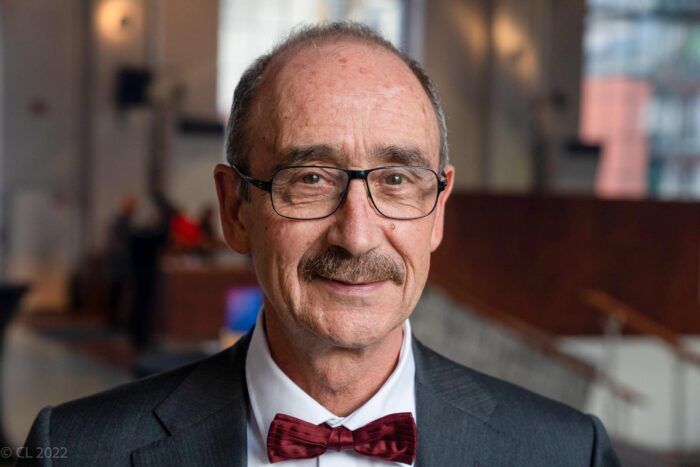
Denis Duboule will deliver the 2023 César Milstein Lecture on Thursday 26th January at 10:30AM (GMT). His talk, ‘Understanding the Hox timer by using mammalian pseudo-embryos’ will take place in the LMB’s Max Perutz Lecture Theatre and is open in-person to all who are interested.
Denis is Professor of Genome Evolution and Development at the Collège de France, Paris, Professor at the Federal Institute of Technology (EPFL) in Lausanne where he leads the laboratory of Developmental Genomics, and Honorary Professor of Biology at the University of Geneva where he chaired the Department of Genetics and Evolution.
Denis’ research focus is the regulatory mechanisms behind vertebrate pattern formation in both developmental and evolutionary contexts. In particular, he is a pioneer of research on Hox genes, or ‘architect genes’, responsible for coordinating body patterning during embryonic development. His identification of Hox genes in mammals has opened up a new field of highly-active research. Over the last 20 years, Denis has implemented an expansive programme aimed at genetically dissecting different aspects of Hox gene biology though both established mouse molecular genetic approaches and by designing new strategies using in vivo chromosome engineering to generate novel genomic rearrangements.
His research has been recognised with numerous awards and accolades, including the Louis-Jeantet Prize for Medicine in 1998, the Marcel Benoist Prize in 2003, and the International INSERM Prize in 2010. Denis is also a Foreign Member of the Royal Society and the National Academy of Sciences.
Lecture abstract
Understanding how developmental time is encoded in genomes is a major challenge, either for mechanisms acting in trans (e.g., oscillations) or for those acting in cis. In the latter category, clustered Hox genes are activated during development in a precise time-sequence that follows the linearity of the DNA polymer. The mechanism underlying this in cis timing phenomenon (the Hox timer), which is implemented throughout the neck of the ‘developmental hourglass’, has remained elusive ever since its initial observation in 1989, due to the difficulty to approach it using early gastrulating mouse embryos.
I will discuss recent results using pseudo-embryos produced out of ES cells (‘gastruloids’) as an alternative approach to address this question and will show that the temporal dynamic of the system may rely upon the use of series of CTCF sites as successive insulating elements. In this view, the directionality and processivity of the mechanism are fixed by the asymmetric over-loading of cohesin complexes at one extremity of the gene cluster. While this mechanism can secure the sequential deployment of Hox gene transcription and hence the proper establishment of axial structures within any given vertebrate species, it also offers some evolutionary flexibility, for minimal modifications in the number, position or affinity of these sites would translate into heterochronic transcription offering possibilities for morphological evolution.
Background information
The César Milstein Lecture is named in honour César Milstein, an LMB Nobel Laureate. This named lecture is one of a series of named lectures organised by the LMB and given by eminent scientists from around the world.
César was born in Argentina in 1927. After completing PhDs in both Buenos Aires and Cambridge, he embarked on a brief spell of research in Argentina before he joined the LMB in 1963. César then spent the rest of his career and his life here.
César developed an early interest in immunology, with his research concentrated on antibody structure and diversity. In the early 1970s, he and his postdoc, Georges Köhler, developed the technique used to produce monoclonal antibodies. This work led to them being jointly awarded the 1984 Nobel Prize in Physiology and Medicine. The technique developed by César and Georges has since been developed further by LMB colleagues for therapeutic applications, leading to the creation of several MRC spin-out companies. César continued his research on how somatic mutation arises in immunoglobulin genes. He died in Cambridge on 24th March 2002.